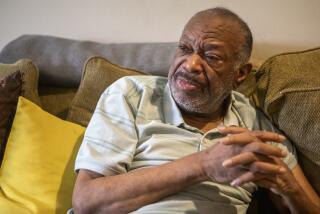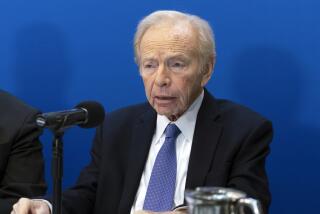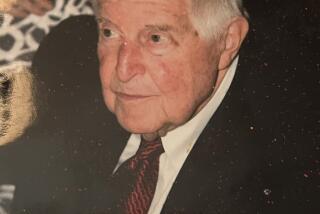Charles T. Manatt dies at 75; Democratic Party leader and diplomat
Charles T. Manatt, who founded one of the biggest and most influential law firms in Los Angeles and then became a political power as chairman of the state and national Democratic parties, died Friday night. He was 75.
Manatt died at Kindred Hospital in Richmond, Va., of complications from a stroke suffered after surgery in November, according to his daughter, Michele A. Manatt.
Manatt assumed a thankless task as chairman of the Democratic National Committee, taking over just when the Reagan era was dawning.
Democrats were beaten politically and psychologically when he took the job in early 1981. Manatt later recalled how he arrived at the party’s rented Washington offices to find an outdated donor list and 12 of 15 electric typewriters broken.
Although Reagan won reelection in a 1984 landslide, the one presidential contest of Manatt’s term, few blamed the Democratic chairman. With an eye for detail and flair for low-key leadership, he positioned the party for later success by modernizing its fundraising and grass-roots operations and overseeing construction of the Democratic Party’s first permanent national headquarters.
In 1992, Manatt served as national co-chairman of Bill Clinton’s winning presidential campaign, and in 1999, during Clinton’s second term, he became U.S. ambassador to the Dominican Republic.
“We were friends for 30 years,” former President Clinton said in a statement, “and I saw firsthand how he used his energy, intellect, and common sense to help restore the Democratic Party after 1980, to make America more prosperous and just, and to make friends for our nation around the world.”
Charles Taylor Manatt was born June 9, 1936, in Chicago. Soon after, his family moved to a 320-acre farm on the outskirts of Audubon, Iowa.
The younger of two boys, Manatt was not, by his own estimation, good at sports. But he had a talent for organizing — he managed his high school football and basketball teams — and keeping busy. On top of his farm chores, he was an Eagle Scout, active in the 4-H Club, an officer of Iowa Future Farmers of America, senior class president, student council president and member of the speech club (the latter consisting of 17 girls and Manatt).
He was a Democrat early on, volunteering at age 16 for Adlai Stevenson’s 1952 presidential campaign. After graduating from Iowa State University, where he joined the Young Democrats, Manatt started law school at the University of Iowa, then transferred to George Washington University, where he graduated in 1962.
While at Iowa State, Manatt married Kathleen Klinkefus, his high school sweetheart and a fellow student. In 1964, the couple moved to Los Angeles, where Manatt took a job with the powerhouse law firm O’Melveny & Myers. He also dove into California politics, helping create Southern California Young Citizens for Johnson and volunteering for two future U.S. senators, Alan Cranston and John Tunney.
In 1965, Manatt paired with Tom Phelps — whom he met at Iowa State — to create a law firm, starting with a walk-up office near Hollywood Boulevard and Vine Street. The two weren’t paid much, Manatt later joked, and were probably worth the price.
Manatt, Phelps and Phillips eventually would become one of the largest law firms in the country, with hundreds of attorneys and a constellation of celebrity clients, including, at various times, Bob Dylan, Barbra Streisand, Michael Douglas, Donald Trump and the firms Time Warner, Lionsgate and DreamWorks.
Manatt also worked in banking, becoming chairman of the First Los Angeles Bank in 1973 and later serving a term as president of the California Bankers Assn.
He was perhaps best known, though, for his work in politics. Manatt served as chairman of the California Democratic Party in the early 1970s, then rose steadily through the ranks of the national party.
His law firm served as a kind of farm team for party operatives. In 1984, when Manatt led the Democratic National Committee, associates headed the California campaigns of the party’s two leading presidential hopefuls, Gary Hart and Walter Mondale.
Mondale won the nomination and tried to oust Manatt as chairman, in favor of his own pick. But with the support of organized labor and party operatives around the country, Manatt survived the move. It was a misstep that seemed to portend the disaster awaiting Mondale at the polls.
After serving as ambassador in the Clinton administration, Manatt returned to his law firm, working from its offices in Washington, where he remained active in Democratic politics, and launched an international consulting practice.
In 2008, Manatt was thrust into the controversy over Democratic “superdelegates,” the party leaders given a large voice in selection of the party’s presidential nominee. Manatt created the slots in response to complaints that party leaders had too little say in the process.
With Barack Obama battling Hillary Clinton — and the race in the hands of superdelegates — some argued the opposite: that party leaders had too much power and might overturn the will of voters. Manatt defended the process. “The theory … is peer review,” he told the Des Moines Register, with judgment resting in the hands of “the senior and most responsive and most informed officials” in the Democratic Party.
Manatt owned livestock farms in western Iowa, where he grew up, and was a frequent visitor, even outside the political season.
Besides his wife of 53 years, Manatt is survived by daughter Michele, sons Timothy and Daniel, and three grandchildren.
The funeral and burial will be next week in Audubon, Iowa.
A memorial service is planned for September at Washington’s Metropolitan Memorial United Methodist Church, with a celebration of his life in Los Angeles this fall.
More to Read
Start your day right
Sign up for Essential California for news, features and recommendations from the L.A. Times and beyond in your inbox six days a week.
You may occasionally receive promotional content from the Los Angeles Times.





















































